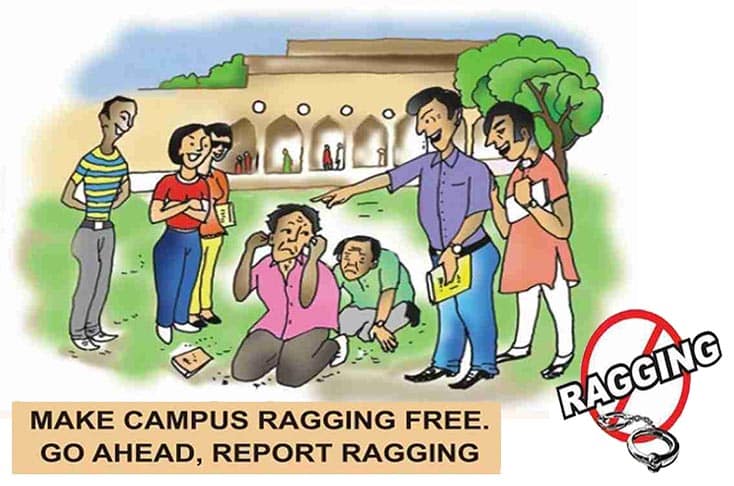What’s in today’s article?
- Why in News?
- The Supreme Court of India on Ragging
- The UGC Guidelines to Prevent Ragging
- Laws to Prevent Ragging in India
- Way Ahead
Why in News?
- An 18-year-old undergraduate student died after falling from the 2nd floor of his hostel in the Jadavpur University campus in Kolkata last week.
- As the family of the student has alleged that he was being ragged on campus, the article highlights how the Indian laws/ policies deal with ragging.
The Supreme Court of India on Ragging:
- Meaning: The Court in a 2001 (Vishwa Jagriti Mission) case, defined ragging as:
- Any disorderly conduct (by words spoken or written or by an act), which has the effect of causing annoyance, hardship or psychological harm/ shame or embarrassment in a fresher or a junior student, adversely affecting their physique or psyche.
- The cause of indulging in ragging: To derive sadistic pleasure (by inflicting pain) or showing off power, authority or superiority by the seniors over their juniors or freshers.
- What the SC said? It termed ragging as the “menace pervading the educational institutions of the country.”
- Key guidelines on anti-ragging:
- Setting up proctoral committees to prevent ragging and internally address complaints against ragging.
- If the ragging becomes unmanageable or amounts to a cognisable offence the same may be reported to the police.
The UGC Guidelines to Prevent Ragging:
- In 2009, the SC in another case dealt with the ragging issue appointed a committee headed by former CBI Director RK Raghavan.
- The recommendations of the committee were subsequently formalised by the University Grants Commission (UGC) in the form of detailed guidelines for universities on anti-ragging.
- The guidelines [The Regulations on Curbing the Menace of Ragging in Higher Educational Institutions] include 9 explanations of what could constitute ragging:
- Teasing, treating or handling a fellow student with rudeness;
- Causing physical or psychological harm;
- Causing or generating a sense of shame;
- Academic activity of any other student or a fresher;
- Exploiting a fresher or any other student for completing academic tasks assigned to an Individual or a group of students;
- Financial extortion or forceful expenditure;
- Homosexual assaults, stripping, forcing obscene and
- Lewd acts, gestures, causing bodily harm.
- At an institutional level, the UGC requires universities to declare its intent publicly to prevent ragging and requires students to sign an undertaking that they will not engage in ragging activities.
- The institution shall set up appropriate committees, including the course-incharge, student advisor, Wardens and some senior students as its members, to actively monitor, promote and regulate healthy interaction between the freshers and seniors.
- If found guilty by the anti-ragging committee, the UGC guidelines require any member of the committee to “proceed to file a First Information Report (FIR), within 24 hours of receipt of such information.
Laws to Prevent Ragging in India:
- While ragging is not a specific offence, it could be penalised under several other provisions of the Indian Penal Code (IPC).
- For example, the offence of wrongful restraint is criminalised under Section 339 of the IPC which is punished with simple imprisonment up to 1 month, or with fine up to Rs 500, or with both.
- Wrongful restraint is an offence when a person is prevented from proceeding in any direction in which that person has a right to proceed.
- Section 340 criminalises wrongful confinement which is defined as wrongfully restraining any person in such a manner as to prevent that person from proceedings beyond certain circumscribing limits.
- Several states have special laws for anti-ragging. For example,
- The Kerala Prohibition of Ragging Act 1998 provides for suspension or dismissal of the student accused of ragging and mandatorily requires the college administration to inform the nearest police station.
- If an educational institution fails to do so, it would be “deemed abetment” to commit the offence.
Way Ahead:
- Fixing the accountability of authorities.
- Add more teeth to anti-ragging laws at the central and state levels.
- Conducting regular campus checks and awareness building exercises (among freshers regarding safeguards available) at the campuses especially during the first few months of the beginning of a new session.
Q1) What will be the new name of the Indian Penal Code (IPC)?
The Bharatiya Nyaya Sanhita (BNS) Bill 2023 will repeal and replace the more than 160-year-old Indian Penal Code (IPC).
Q2) What is the University Grants Commission (UGC)?
UGC is a statutory body under Department of Higher Education, Ministry of Education, Government of India. It was set up in accordance with the UGC Act 1956 and is charged with coordination, determination and maintenance of standards of higher education in India.
Source: Jadavpur University student death: What the law says about ragging
Last updated on March, 2026
→ UPSC Notification 2026 is now out on the official website at upsconline.nic.in.
→ UPSC IFoS Notification 2026 is now out on the official website at upsconline.nic.in.
→ UPSC Calendar 2026 has been released.
→ UPSC Final Result 2025 is expected to be released soon.
→ Check out the latest UPSC Syllabus 2026 here.
→ Join Vajiram & Ravi’s Interview Guidance Programme for expert help to crack your final UPSC stage.
→ UPSC Mains Result 2025 is now out.
→ UPSC Prelims 2026 will be conducted on 24th May, 2026 & UPSC Mains 2026 will be conducted on 21st August 2026.
→ The UPSC Selection Process is of 3 stages-Prelims, Mains and Interview.
→ Prepare effectively with Vajiram & Ravi’s UPSC Prelims Test Series 2026 featuring full-length mock tests, detailed solutions, and performance analysis.
→ Enroll in Vajiram & Ravi’s UPSC Mains Test Series 2026 for structured answer writing practice, expert evaluation, and exam-oriented feedback.
→ Join Vajiram & Ravi’s Best UPSC Mentorship Program for personalized guidance, strategy planning, and one-to-one support from experienced mentors.
→ Check UPSC Marksheet 2024 Here.
→ UPSC Toppers List 2024 is released now. Shakti Dubey is UPSC AIR 1 2024 Topper.
→ Also check Best UPSC Coaching in India


















